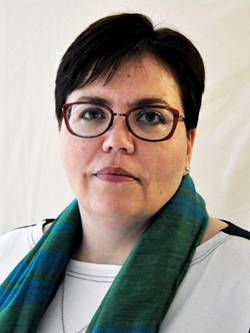
Johanna Söderholm
For Johanna Söderholm, an English professor at Vaasa University and Abo Akademi University in Finland, there was no better time than now to go to Poland and participate in the Auschwitz: The Past is Present professional development program.
Söderholm joined 24 other teachers from around the world to help commemorate the 70th anniversary of the liberation of Auschwitz in Poland by learning new methods for teaching the Holocaust. They were chosen to attend the Auschwitz: The Past is Present professional development program led by USC Shoah Foundation and Discovery Education to commemorate the 70th anniversary of the liberation of Auschwitz. The educators from 11 different countries representing four continents attended a four-day workshop designed to deepen their understanding of the historical landscape of Poland before, during and after the Holocaust and increase their knowledge of authentic sites including Auschwitz-Birkenau.
Söderholm studied the Holocaust while living and working in Estonia and also at Yad Vashem’s International Seminar for Educators last summer. Though the Holocaust is typically taught by history teachers, she said she feels she has many opportunities to teach it in her class, though literature, social science, psychology, ethics and more. She finds the Holocaust still incredibly relevant for today’s students since it did not happen very long ago.
“Being a sociologist I can never separate what I teach from “reality”, from what goes on in contemporary society or, for that matter, from what went on in history,” she said. “The Holocaust and Auschwitz in particular is a dark chapter in human history, but it was a very modern process. What occurred was not a random and senseless killing but a methodical and efficient annihilation of human beings.”
Söderholm said she was pleasantly surprised that so many people were interested in her trip to Poland before she went. She was interviewed by local media and has been asked to talk about her experiences at other schools and a teacher conference later this spring. She will also use IWitness in a course she is currently teaching for future English educators.
In addition to adopting her own cross-disciplinary approach to teaching the Holocaust, Söderholm wants to see it taught across a wider age range – especially today, in an age of increased anti-Semitism, racism and xenophobia throughout Europe and Scandinavia. She said it feels more important than ever that young people are aware of the “mechanisms and ideology” that led to the Holocaust.
“The question for me is not so much ‘have we not learned anything from history?’ as it is ‘do we not want to learn anything from history?’” Söderholm said.
Testimony will be an extremely valuable resource for Söderholm to teach future students and allow them to hear the stories of Holocaust survivors. In Finland, the Jewish community is small and not many survivors have spoken publicly.
“That is why USC Shoah Foundation and IWitness is such an important resource for teachers like me. My students can hear and see the witnesses from across time and space but as clearly as if they were in the same room,” Söderholm said.